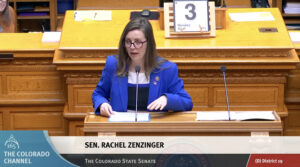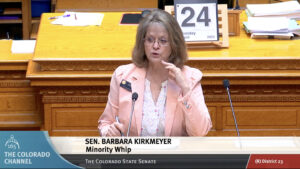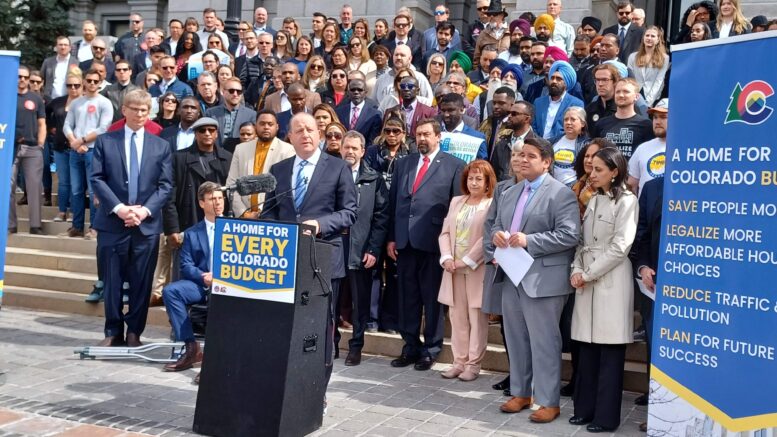Gov. Jared Polis’ grand plan to boost Colorado’s housing stock by removing local construction obstacles got a major makeover Wednesday that essentially bumped the once wide-ranging land-use reform bill down to requiring that the state and local governments undertake housing needs assessments.
Senate Bill 213, as it stands after a critical Senate Appropriations Committee hearing, still bars local governments from treating modular and manufactured housing differently from site-built homes in terms of what is allowed within the jurisdictions. It also bars cities and counties from limiting the number of unrelated people who can live together to any total lower than the number of related people who can live together, a familial restriction that few if any governments have.
But sponsoring Sen. Dominick Moreno, aiming to save the bill from what appeared to be a likely killing by the committee due to a flurry of opposition from municipal leaders, agreed to take out all other sections that pre-empted local law on the density of housing that can be built. Instead of removing construction limitations, SB 213 now creates a 13-member multi-agency committee to study and develop recommendations on increasing statewide housing supply and affordability and to help local governments create housing-needs and comprehensive plans.
“I think it really comes down to: What was my number-one reservation with the bill in its prior form?” said Sen. Rachel Zenzinger, the Arvada Democrat who introduced the amendment to make over the bill after saying that she would not undercut municipal rights. “My number-one reservation was the pre-emption that was contained in the bill.”

Colorado state Sen. Rachel Zenzinger speaks in her chamber earlier this session.
The intended land-use reform
Polis rolled out SB 213 on March 22, surrounded by housing advocates, business groups and environmental organizations and saying that the state needs to step in at a time when Colorado is short some 117,000 units and housing prices have risen precipitously in recent years. The shortage has become a business issue because employers have reported having trouble recruiting and retaining employees who can’t afford to live near their jobs and must commute into cities from increasing distances away.
In its initial iteration, SB 213 sought to override local control by permitting property owners in all substantially sized urban centers and rural resort job centers to build “middle housing” ranging from duplexes to six-plexes on land zoned for single-family housing and to add accessory dwelling units like mother-in-law flats as a property right. It also would have required those cities, ranging from Denver to Durango to Dillon, to allow denser multifamily housing along key and transit-oriented corridors and banned them from passing laws requiring minimum square footage of dwellings.
Even as construction groups saw the proposal as an opportunity to add badly needed housing stock and drive down the price of new housing through increased competition, it quickly became obvious that city leaders saw it as an affront to their ability to oversee local growth. And that became the defining division that led to Wednesday’s changes.
Municipalities push back
At the bill’s first hearing in the Senate Local Government and Housing Committee, for example, Adams County Commissioner Eva Henry said that the state’s housing shortage “has been created by sporadic land-use decisions made by inexperienced politicians” at the local level. The subsequent request by her and other supporters to create minimum statewide standards for substantially sized localities fueled mayors from Colorado Springs to Broomfield to Aspen to decry such usurping of the local permitting process and to threaten lawsuits.

Colorado Senate Majority Leader Dominick Moreno speaks at a March news conference announcing a package of housing-reform bills.
Moreno yanked the provisions allowing the construction of middle housing on any single-family-zoned land last week but faced the prospect of losing the bill still in Senate Appropriations, where Zenzinger was the swing vote. Her amendment Wednesday concentrates the bill on developing housing needs assessments at the statewide, regional and local levels and having cities setting housing-needs goals through plans that identify local gaps and resources.
SB 213 also requires local communities to examine water needs through comprehensive plans and encourages utility providers to adopt water-allocation policies that give the utilities the opportunity to reserve water supplies for affordable housing rather than less-efficient land uses. And the multi-agency committee that it would fund would engage communities across Colorado, provide local grant funding for these processes and help to identify key corridors for potential bus rapid transit and high-frequency bus service.
GOP still not on board with land-use reform
The goal of the committee would be to provide recommendations to the Legislature by the end of this year, setting up another potential battle in the 2024 session. In addition to looking at ways to increase housing, affordable and otherwise, it would seek to align water availability with housing goals and mesh all of this as well with the state’s greenhouse-gas emissions goals.
Even the pared-down bill could not gain any Republican support Wednesday, when it moved from the appropriations committee to a coming debate on the Senate floor on a 4-3 party-line vote. Part of that animus surrounded the decision to make such a momentous change to a high-profile bill in a committee that does not take public testimony on bills that have come to it from other committees, but some surrounded the remaining parts of the bill.

Colorado state Sen. Barbara Kirkmeyer speaks on the Senate floor earlier this week.
Sen. Barbara Kirkmeyer, for example, complained that of the 13 new members of the new committee, seven would come via appointments from Polis or his department heads and three others would come directly from Senate President Steve Fenberg, D-Boulder. There is no requirement such a Denver-and-Boulder-centric group of officials must get input from throughout the state, the Brighton Republican said, and Kirkmeyer tried unsuccessfully to mandate a statewide housing summit with gatherings in at least six parts of the state.
No limits on unrelated residents
Sen. Bob Gardner, R-Colorado Springs, asked Moreno, the Senate majority leader, why he chose to keep in the bill the ban on cities establishing or enforcing residential occupancy limits for non-related individuals when he jettisoned so many other provisions. Moreno, a former Commerce City council member, said he’s fought similar policies since his earliest days of public service because such policies often are rooted in racism and targeted at a specific demographic.
“They often are about ‘too many Mexicans living in one household,’ and that’s why I chose to keep this in,” Moreno said.
Colorado Municipal League Executive Director Kevin Bommer tweeted after the appropriations committee meeting that while he still believes tweaks are needed to SB 213, his organization would drop its opposition to the bill and support it if the new amendment is retained.
“There is a lot (of) work to do, and we’re better off working together,” Bommer wrote.
Meanwhile, a similarly Polis-backed bill to ban cities from imposing or enforcing limits on the number of new building permits that they grant, House Bill 1255, passed the House on a 38-25 vote on Tuesday, over objections about usurping local control. That likely will get its first hearing in a Senate committee early next week.
